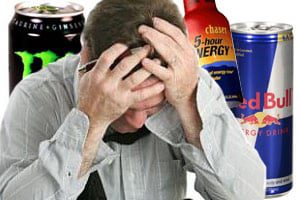
The potential dangers associated with highly-caffeinated drinks such as Red Bull, Monster Energy, and 5-Hour Energy continue to spark the attention of U.S. regulators. The fastest-growing part of the beverage industry, according to The New York Times, energy drinks accounted for more than a massive $10 billion last year alone and exceeded consumption of iced […]
 The potential dangers associated with highly-caffeinated drinks such as Red Bull, Monster Energy, and 5-Hour Energy continue to spark the attention of U.S. regulators.
The potential dangers associated with highly-caffeinated drinks such as Red Bull, Monster Energy, and 5-Hour Energy continue to spark the attention of U.S. regulators.
The fastest-growing part of the beverage industry, according to The New York Times, energy drinks accounted for more than a massive $10 billion last year alone and exceeded consumption of iced tea and sports drinks. The campaign for energy drinks has been a successful one, targeted to younger consumers, specifically teenagers, with promises of increased mental and physical benefits.
But, the promises of increased mental acuity and physical stamina might not be all they say they are and have been overshadowed with reports of serious injuries and deaths. In fact, a New York Times review of research studies revealed that the industry is based on a cocktail of ingredients that, without the caffeine, offer little if any of the promised benefits. “If you had a cup of coffee you are going to affect metabolism in the same way,” Dr. Robert W. Pettitt, an associate professor at Minnesota State University in Mankato, who has studied the drinks, told The New York Times.
The drinks are promoted as being different than simply over-caffeinated brews with promises such as “Red Bull gives you wings,” or that Rockstar Energy is “scientifically formulated,” or that Monster Energy is a “killer energy brew,” The New York Times noted. The promises come with a hefty price. A 16-ounce energy drink sells for about $2.99 a can, contains about the same amount of caffeine as a 30-cent tablet of NoDoz, and is more than one dollar more expensive than a 12-ounce cup of Starbucks coffee which sells for $1.85, The New York Times pointed out.
Research on energy drinks has long been lacking with minimal human studies of the drinks and their ingredients. What has been seen is that the drinks are generally about the caffeine, say researchers, according to The New York Times. “These are caffeine delivery systems,” Dr. Roland Griffiths, a researcher at Johns Hopkins University who has studied energy drinks, told the Times. “They don’t want to say this is equivalent to a NoDoz because that is not a very sexy sales message.”
Energy drink makers tout proprietary blends and claims that stimulants, such as guarana and taurine, provide an array of benefits. As we’ve written, guarana and taurine are additives that claim to be all natural and, like other additives found in supplements, are not subject to U.S. Food & Drug Administration (FDA) regulation. There is not much credible data to show these products and their ingredients are safe for human consumption or what levels are considered safe. And, while energy drink labels claim the products do not contain more caffeine than a typical cup of coffee, with no appropriate regulations, there is insufficient available evidence to validate those claims.
Consider that a 12-ounce soda usually contains about 71 milligrams of caffeine, which the FDA considers safe. Meanwhile, caffeine in energy drinks typically ranges from 160 to 500 milligrams per serving, according to an FDA letter this August, written in response to Senator Durbin’s request for increased regulation of the products, said Bloomberg.com previously.
We recently wrote that the FDA posted information on 21 reports it has received since 2004 regarding the energy drink, Red Bull. Some reports mentioned hospitalizations for cardiac issues and vomiting. The FDA also recently confirmed or released information on 18 filings involving deaths and over 150 other filings involving injuries that mentioned one of four popular energy drinks: Red Bull, Monster Energy, Rockstar, and 5-Hour Energy, said a prior report by The New York Times. Yet, a federal report revealed that over 13,000 emergency room visits in 2009 all mentioned an energy drink as a possible cause.
Based on FDA records and a prior interview between an agency official and The New York Times, 13 other deaths in the past four years may be related to the 5-Hour Energy drink. Unlike other energy drinks packaged as traditional beverages, the 5-Hour Energy drink is a super-caffeinated, 2-ounce “energy shot.” The New York Times previously noted that, since 2009, 5-Hour Energy was discussed in about 90 FDA filings, including more than 30 reports that involved significant or life-threatening injuries, such as heart attacks and convulsions. A spontaneous abortion was involved one case. Also, a review of a summary of agency records made by the media outlet revealed that, in October 2012, the FDA received five filings concerning deaths associated with yet, another, energy drink, Monster Energy.


